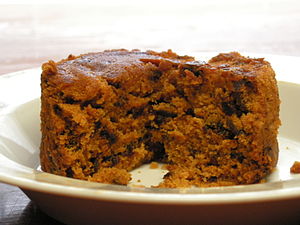| Revision as of 17:44, 1 August 2014 edit68.172.52.21 (talk)No edit summary← Previous edit | Revision as of 17:44, 1 August 2014 edit undoClueBot NG (talk | contribs)Bots, Pending changes reviewers, Rollbackers6,439,046 editsm Reverting possible vandalism by 68.172.52.21 to version by Excirial. False positive? Report it. Thanks, ClueBot NG. (1912076) (Bot)Next edit → | ||
| Line 19: | Line 19: | ||
| }} | }} | ||
| '''Spotted dick''' is a ] popular in Britain, containing ] (usually ]s or ]) commonly served with ]. ''Spotted'' refers to the ] (which resemble spots) and ''dick'' may be a contraction or corruption of the word ''pudding'' (from the last syllable) or possibly a corruption of the word '']''<ref> – a 27 Aug 2002 ] article on the etymology of the name</ref> or ''dog'', as "spotted dog" is another name for the same dish with the use of plums rather than currants. Another explanation offered for the word "dick" is that it is the German word for "thick." |
'''Spotted dick''' is a ] popular in Britain, containing ] (usually ]s or ]) commonly served with ]. ''Spotted'' refers to the ] (which resemble spots) and ''dick'' may be a contraction or corruption of the word ''pudding'' (from the last syllable) or possibly a corruption of the word '']''<ref> – a 27 Aug 2002 ] article on the etymology of the name</ref> or ''dog'', as "spotted dog" is another name for the same dish with the use of plums rather than currants. Another explanation offered for the word "dick" is that it is the German word for "thick." | ||
| According to the ], the earliest documented reference is a recipe for "Plum Bolster, or Spotted Dick", in ]'s ''The modern Housewife or ménagère'' (1849).<ref>"spotted, adj.". OED Online. March 2012. Oxford University Press. http://www.oed.com/view/Entry/187530?redirectedFrom=spotted%20dick (accessed March 17, 2012).</ref><ref>http://www.worldcat.org/title/modern-housewife-or-menagere/oclc/252570657&referer=brief_results (accessed March 17, 2012).</ref> | According to the ], the earliest documented reference is a recipe for "Plum Bolster, or Spotted Dick", in ]'s ''The modern Housewife or ménagère'' (1849).<ref>"spotted, adj.". OED Online. March 2012. Oxford University Press. http://www.oed.com/view/Entry/187530?redirectedFrom=spotted%20dick (accessed March 17, 2012).</ref><ref>http://www.worldcat.org/title/modern-housewife-or-menagere/oclc/252570657&referer=brief_results (accessed March 17, 2012).</ref> | ||
Revision as of 17:44, 1 August 2014
 Spotted dick Spotted dick | |
| Type | Pudding |
|---|---|
| Place of origin | United Kingdom |
| Created by | Alexis Soyer |
| Main ingredients | Suet, dried fruit |
Spotted dick is a pudding popular in Britain, containing dried fruit (usually currants or raisins) commonly served with custard. Spotted refers to the dried fruit (which resemble spots) and dick may be a contraction or corruption of the word pudding (from the last syllable) or possibly a corruption of the word dough or dog, as "spotted dog" is another name for the same dish with the use of plums rather than currants. Another explanation offered for the word "dick" is that it is the German word for "thick."
According to the Oxford English Dictionary, the earliest documented reference is a recipe for "Plum Bolster, or Spotted Dick", in Alexis Soyer's The modern Housewife or ménagère (1849).
See also
References
- What's the origin of "spotted dick"? – a 27 Aug 2002 Straight Dope article on the etymology of the name
- "spotted, adj.". OED Online. March 2012. Oxford University Press. http://www.oed.com/view/Entry/187530?redirectedFrom=spotted%20dick (accessed March 17, 2012).
- http://www.worldcat.org/title/modern-housewife-or-menagere/oclc/252570657&referer=brief_results (accessed March 17, 2012).